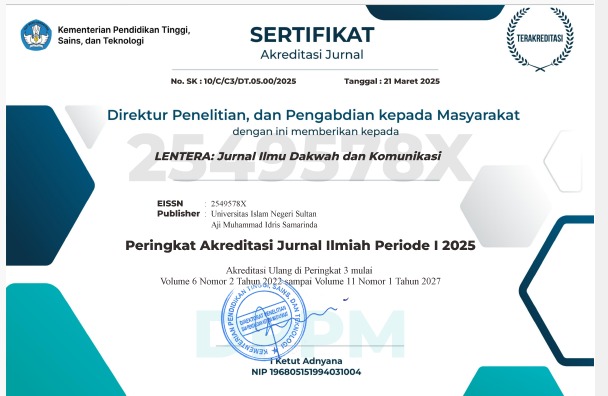KEBERHASILAN DAN KEGAGALAN KOMUNIKASI PUBLIK: ASPEK DAKWAH PADA GERAKAN 212 DI JAKARTA DAN GERAKAN PEMURNIAN ISLAM DI LOMBOK
Abstract
The practice of da’wa in a democratic society is often used as a tool to influence public policy trhough political means. This is often the case because the practice of da’wa is relatively easy to be exploited by politicians. They often transform religious messages of da’wa into political ones without loosing their attractiveness before the audience. The aim of this paper is, therefore, to aswer two inter-related questions; (1) how political messages masked with religious symbols become effective and therefore are able to influence public policy and (2) how such messages become not effective and therefore are not able to influence public policy. To answer those questions, success story in the case of 212 movement in Jakarta and a failure story in the case of religious purification of Islam in Lombok are analyzed to find elements that play important roles regarding the success and failure of a da’wa movement to influence public policy.
Keywords: Public policy, Public Communication, Diffusion of Political Messages, Islamic Da’wa
References
Athhar, Zaki Yamani. “Kearifan Lokal dalam Ajaran Islam Wetu Telu di Lombok.” ULUMUNA 9, no. 1 (June 10, 2005): 70. https://doi.org/10.20414/ujis.v9i1.443.
Beddy Irawan Maksudi, Sistem Politik Indonesia Pemahaman Secara Teoritik dan Empirik, Jakarta: PT Rajawali Pers, 2012
Birkland, Thomas A. An Introduction to the Policy Process: Theories, Concepts, and Models of Public Policy Making. 3rd ed. Armonk, NY: M.E. Sharpe, 2010.
Dennis Fox dan Isacc Prilletensky. Psikologi Kritis, Jakarta: PT Mizan Publika, 2005
Dryzek, John S., Bonnie Honig, and Anne Phillips, eds. The Oxford Handbook of Political Theory. Oxford Handbooks of Political Science. Oxford ; New York: Oxford University Press, 2006.
Easton, David, John G Gunnel, and Luigi Graziano. The Development of Political Science: A Comparative Survey. London; New York: Routledge, 2002.
Herbert H. Hyman. Political Socialization: A Study in the Psychology of Political Behavior. 1st ed. London: The Free Press, 1959.
Muhammad Wildan. “Islamism and Democratization in the Post 411 and 212 Rallies of Indonesia.” Thinking ASEAN. January 2016.
Petty, Richard E., and John T. Cacioppo. Attitudes and Persuasion Classic and Contemporary Approaches. Boulder (Colo.): Westview Press, 1996.
———. “The Elaboration Likelihood Model of Persuasion.” In Communication and Persuasion, by Richard E. Petty and John T. Cacioppo, 1–24. New York, NY: Springer New York, 1986. http://link.springer.com/10.1007/978-1-4612-4964-1_1.
Stephen W. Litteljhon dan Karen A. Foss, Teori Komunikasi, Jakarta: Salemba Humanika, 2008
Toto Pribadi dkk, Sistem Politik Indonesia, Tangerang: Universitas Terbuka, 2014
Van Aelst, Peter, Jesper Strömbäck, Toril Aalberg, Frank Esser, Claes de Vreese, Jörg Matthes, David Hopmann, et al. “Political Communication in a High-Choice Media Environment: A Challenge for Democracy?” Annals of the International Communication Association 41, no. 1 (January 2, 2017): 3–27. https://doi.org/10.1080/23808985.2017.1288551.
Vickers, Adrian. A History of Modern Indonesia. Cambridge University Press, 2013.
Woodward, Mark, Mariani Yahya, Inayah Rohmaniyah, Diana Murtaugh Coleman, Chris Lundry, and Ali Amin. “The Islamic Defenders Front: Demonization, Violence and the State in Indonesia.” Contemporary Islam 8, no. 2 (May 2014): 153–71. https://doi.org/10.1007/s11562-013-0288-1.
Copyright (c) 2018 LENTERA: Jurnal Ilmu Dakwah dan Komunikasi

This work is licensed under a Creative Commons Attribution-ShareAlike 4.0 International License.
Penulis yang menerbitkan artikel di Lentera: Jurnal Ilmu Dakwah dan Komunikasi setuju dengan ketentuan berikut:
- Penulis memiliki hak cipta artikel dan memberikan hak jurnal untuk publikasi pertama dengan karya yang secara simultan dilisensikan di bawah CC-BY-SA atau The Creative Commons Attribution – ShareAlike Licence.
- Penulis dapat membuat perjanjian kontrak tambahan yang terpisah untuk distribusi non-eksklusif versi jurnal yang diterbitkan dari karya tersebut (misalnya, mempostingnya ke repositori institusional atau menerbitkannya dalam sebuah buku), dengan pengakuan atas publikasi awalnya di jurnal ini.
- Penulis diizinkan dan didorong untuk memposting pekerjaan mereka secara online (misalnya, dalam repositori institusional atau di situs web mereka) sebelum dan selama proses pengajuan, karena dapat menyebabkan pertukaran yang produktif, serta kutipan yang lebih awal dan lebih besar dari karya yang diterbitkan (Lihat The Effect of Open Access)
Authors who publish articles in Lentera: Jurnal Ilmu Dakwah dan Komunikasi agree to the following terms:
- Authors retain copyright of the article and grant the journal right of first publication with the work simultaneously licensed under a CC-BY-SA or The Creative Commons Attribution–ShareAlike License.
- Authors are able to enter into separate, additional contractual arrangements for the non-exclusive distribution of the journal's published version of the work (e.g., post it to an institutional repository or publish it in a book), with an acknowledgment of its initial publication in this journal.
- Authors are permitted and encouraged to post their work online (e.g., in institutional repositories or on their website) prior to and during the submission process, as it can lead to productive exchanges, as well as earlier and greater citation of published work (See The Effect of Open Access).












.png)
